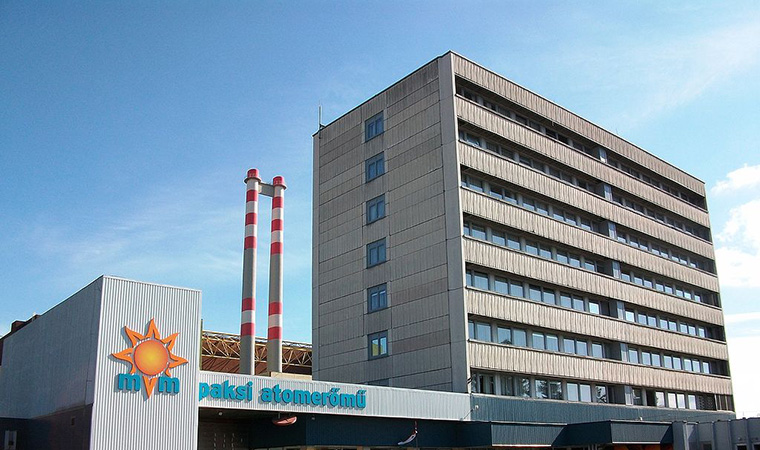
Western mass-media “blocked” NPP construction in Hungary
back to contentsFinancial Times newspaper wrote about that the European Union has supposedly imposed a veto over the construction by the Russian experts of a nuclear power plant in Hungary, referring to sources in EU structures.
The newspaper notices that Hungary coordinated in 2013 with EU the future contract with Russia on the NPP according to VVER-1200 technology. The first document is the EPC-contract (engineering, procurement, construction) for two new power units, in which tasks for the next 12 years were stipulated. The second document regulates service conditions of the future NPP power units; the third document regulates conditions of NPP provision with nuclear fuel. Russia will provide Hungary with the loan of up to 10 billion euro for this project.
However, during signing of contracts the Hungarian party has supposedly concealed several details due to national safety reasons, which caused suspicion in Bruxelles. Financial Times, referring to unidentified sources, has informed that the European Commission supported Euroatom’s position, which supposedly refused to confirm the transaction clause “on the use of nuclear fuel of exclusively Russian fabrication”. Journalists assumed that this unpublished decision “will cause new tension in relations between the Kremlin and Bruxelles”.
After the manner of Financial Times a number of Hungarian mass-media have written that Tibor Navrachich, the European Commission member from Hungary, confirmed that during the last week session the authority approved Euroatom’s proposal and blocked the nuclear contract of Hungary with Russia.
Misled
Statements of the western mass-media about the supposedly blocked project on completion of Hungarian Paks NPP are false and completely misleading, declared to journalists Zoltan Kovach, the state secretary of Hungary on the public diplomacy and public relations. Euroatom and Euroatom’s purchasing agency, acting on the basis of the contract, have considered the contract on nuclear fuel supply, in connection with which they requested specific changes. Current approvals in no form block the project and have no influence on the contract on construction of new plant units, which came into force on January 1st, 2015, – said Kovach.
The Cabinet of Hungary expects that after intensive coordination the fuel supply contract will within several weeks “find the final form” taking into account Euroatom’s remarks. “The aforesaid means that the information of Financial Times newspaper and its sources is false and misleads completely”, – said Kovach.
“We have nothing to add to the position of Hungary representatives calling on Financial Times a refutation. We have the same information — Paks NPP extension was coordinated in the beginning with the European Commission and the authorities of Hungary”, – informed in turn the representative of Rosatom.
Anna-Kaisa Itkonen, the European Commission representative, also denied the information on freezing of the Russian-Hungarian contract on Paks NPP extension.
The situation with statements of the western mass-media about the supposed blocking by the European Commission of the Russian-Hungarian project on Paks NPP completion will not have any impact on the other project being implemented with participation of the Russian Federation — Hanhikivi NPP-1 construction in Finland, declared Jan Vapaavuori, the minister of economic development of Finland. “There are no consequences for the Finnish project”, – said the minister, whose statement is published on the department website.
Consultations proceed
Atilla Asodi, authorized by the government of Hungary on the plant extension explained in more detail the Euroatom’s position about fuel delivery to Paks NPP when informing of the population about the project. He has informed that now “a favourable arrangement crystallizes for Hungary and EU concerning the fuel matter of Paks NPP-2. Positions of the parties are very close, a very favorable arrangement will be concluded, which will consider the following issues: technical, economic and matters connected with reliability of deliveries”.
Asodi also added that during contract preparation consultations were performed about fuel supply and EU proposals were considered. Consultations proceed so far. “It is possible that the European Commission will have comments not only concerning the fuel, but other matters as well. Hungary will always be ready to the dialogue, since it intends to implement the project in strict compliance with EU rules,” underlined Asodi.
Asodi has noticed that nuclear fuel of the plant supplier is bought at first for new NPPs due to the terms of a guarantee and due to that simple reason that the supplier has complete information about reactor parameters. He explained in detail the fuel fabrication process, reminding that the uranium filler of fuel elements can be the same, however, FAs are different at the same time. As a rule, the reactor developer defines fuel parameters and fabricates FAs. He reminded that currently only TVEL fuel company of Rosatom fabricates assemblies, which can be used in new reactors of Paks NPP-2.
The authorized by the government representative for NPP extension told about the project progress. In the near future the Russian engineers will start preparation for construction at the planned site of Paks NPP-2, and the general contractor can issue already this year a tender for delivery of turbines and control systems.
As the general contractor, Rosatom retains the reactor island. “On other works, for example, construction of turbine island, the state corporation co-operates with other companies,” says A.Asodi. Rosatom issues many tenders on purchase of turbine island equipment and control systems. Documentation is not ready yet, but in the near future, tenders can be issued this year. Only those companies that passed preliminary qualification of the Russian general contractor and the Hungarian customer can take part in tenders. Preliminary qualification will be performed in several stages depending on the schedule of works, but they shall be connected with serious educational programs. Asodi says that reception of works will not depend on the “nearness” status to Rosatom, since the general contractor is interested in selecting the best and the cheapest proposal during the tender.




